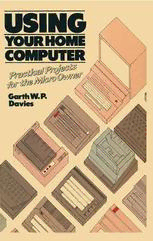Table Of ContentUsing Your Home Computer
MacmillanMicrocomputerBooks
GeneralEditor:Ian Birnbaum
Advanced Graphicswiththe BBC,ModelBMicrocomputer
Ian O.Angelland BrianJ.Jones
Assembly LanguageProgramming for the BBCMicrocomputer
Ian Birnbaum
UsingYour Home Computer
Garth W.P.Davies
AlsofromMacmillan
Advanced Graphicswiththe SinclairZXSpectrum
o.
Ian Angelland BrianJ. Jones
Advanced Programming for the 16KZX81 MikeCostello
BeginningBASIC Peter Gosling
ContinuingBASIC Peter Gosling
Practical BASICProgramming Peter Gosling
Program Your MicrocomputerinBASIC Peter Gosling
Codesfor Computersand Microprocessors P.Goslingand Q. Laarhoven
Microprocessors and Microcomputers - their useand programming
Eric Huggins
The SinclairZX81 - Programming for RealApplications
Randle Hurley
MoreReal Applicationsfor the ZX81 and ZXSpectrum Randle Hurley
Z80 Assembly LanguageProgramming for Students Roger Hutty
DigitalTechniques NoelMorris
Microprocessor and MicrocomputerTechnology NoelMorris
The Alien,Numbereater,and OtherProgramsfor Personal Computers - with
notesonhow theywerewritten John Race
Understanding Microprocessors B.S.Walker
Assembly LanguageAssembled - for the SinclairZX81 AnthonyWoods
Using Your Home Computer
(Practical Projects for the
Micro Owner)
Garth W.P. Davies
M
MACMILLAN PRESS
LONDON
©GarthW.P.Davies1983
Allrights reserved. Nopart ofthis publicationmay be reproduced or
transmitted,in any form orbyany means, without permission
Published by
THEMACMILLANPRESSLTD
LondonandBasingstoke
Companiesandrepresentatives
throughout the world
Typeset by RDLArtsetLtd, Sutton, Surrey
British Library Cataloguing in Publication Data
Davies,GarthW. P.
Usingyourhome computer.
1.Microcomputers
I. Title
001.64'04 QA76.5
ISBN978-0-333-35217-5 ISBN978-1-349-06809-8(eBook)
DOI 10.1007/978-1-349-06809-8
Contents
Acknowledgements vii
1. Introduction 1
2. ComputerSystemsin the Home 3
3. The KeySteps 10
4. Some Sample Systems 16
S. DesignFactors 26
6. MoreSample Systems 42
7. UsefulTechniquesand Methods 64
8. The Pitfalls and theFun 7S
Index 81
Acknowledgements
Theauthorwould like to express hisgratitude to the following persons,without
whom this bookwould not have come into being: Pamela Stewart,for allher
work in decipheringthe handwritingand in typingthe entiremanuscript inits
severalversions; Christiane Scott for her invaluable help in preparingthe illu
strations;Peter Goslingand Ian Birnbaum for their veryhelpfulcommentson
the various drafts;my sons, Rolfand Mark,and my wife, Ellen, for being
enthusiastic usersofahome computer - which led to this book!
1 Introduction
Iloveplayingwith my home computer.Justplaying. There liesthe whole
reason for writing this book. Ihaveenthusiasticallydemonstratedthe wonders
ofmy machine and havebeen shown those of countlessothers - yet have
repeatedlyfound it difficult to answerthe simple,butvery fair, question:
'Butwhat do you useit for?'
Oh, Ihaveshown thatit cancalculate standarddeviations in aflash,play chess
likeagrandmaster, display fiendishly constructedgraphicspictures,but ...
well...use it?
It wasnot difficultto come to the conclusionthat Iwasnot reallyusingthis
super-clever deviceinany normalbusinesssenseofusefulness. Askingaround,I
found that the vastmajority of fellowhome-computer userswereproudto show
meawide rangeofgames,fancy demonstrationsof the machine'spowers,
mathematicalapplicationsand soon, butrelatively fewhad puttheir machines
to what Iwould callreal practical use.
Thereason for this is,Ibelieve,quite simple. The early usersof home com
puters were data-processing specialists.Thesepeople were enormouslyinterested
inthe development of the microcomputerand naturally tended to write computer
programs to test and demonstrate the capabilities of this newtool. In parallel, pre
programmed electronicgameswere on the marketand there wasgreatinterest
generally inthis new dimension in playinggames.Newcomersto computing,pur
chasinghome computersinlargerand largernumbers, naturallydo nothavethe
necessaryskillsto create evenclevererprograms,nor - muchmore importantly
the essentialbackground of systemsdevelopment. Andthat iswhere this book
comesin.
The purposeofthis bookisto help anyonewho owns ahome computerto
useit in simplepracticalwaysin hisorher private life. Soyou willnotfind any
computerprograms here, butratherideason how to make yourcomputerwork
for you. Someone willofcourse haveto do the programmingand Iexpectthat
bynow youhavelearned sufficient BASICfor this,butthepointis:.programming
comesafterthe ideasand processesdescribed inthis bookhavebeen lookedat.
Inthe words ofcomputerspecialists,the normal sequence ofeventsisa
feasibility study(toseeifyourideaispracticaland worthwhile),followed by a
detailed 'systems analysisand design' phase - only thencanthe programmingbe
started,and on the basisofexact specificationsofwhat isto be done.
2 UsingYourHome Computer
Nowfortunately one isnotusually underthe sameconstraintswhen usinga
home computer(exceptfor money!)aswould be the casein abusiness environ
ment,where tight scheduleshaveto bekept and many otherpeople haveto be
involved,etc. Sothe rigorous proceduresofbusiness do nothaveto be applied
in the home. However,the vastbodyofexperiencegainedby now from the use
of computersin the businessenvironmentisnevertheless relevant. Following
certainbasic steps hasbeen proven to beinvaluable in developingacomputer
system and this booktries to identifythose,aswellaspointingoutthe pitfalls.
Equallyimportant,however, arethe actualsuggestionsfor puttingyourhome
computerto practicaluse.There aresome24 detailedideasfor these in this
book,presentedin away that,it ishoped,willenable you to browse through
themand select those for likely applicationin yourenvironment.Hopefully,this
combinationof usingasimplebutsystematicapproachtogetherwitharangeof
practicalsuggestionswillenable you to getrealuse,aswellasfun, outofyour
home computer.
2 Computer Systems in the Home
Whenyou first haveyourhome computer,you will undoubtedlygetalotof
fun from tryingoutthe variousgamesand standard 'routines'thatareprovided
by the manufacturer. Apart from the thrill of seeingthese run on your own
machine,thisinitialphase isnecessaryto getto know what sort ofthings canbe
donewithyournewlyacquired device.Youwillprobablyalsobuysome cassettes
from stores thatoffer arangeofgamesand otherideas.Thisoff-the-shelf
'software' - the instructionsfor making yourmachine do aparticularthing for
you - willfurther widen your horizonsabout the potentialofyour home com
puter.Bythis time,you may havetried somesimpleprogramming,probably
usingthe BASIClanguage,and inno time at allyou willhavethe urgeto make
your machine do something exactlyasyou want it done. Thisisan exciting
feelingwhich willnevercease!
Your skillsinprogramming willincreaseat everyattempt. The problem isthat
you willbe constantlylooking for things for yourmachine to do otherthan
givefancy, butrathertrivial, demonstrationsofits capabilities. You can of
course try devisingyour owngames,butin the longterm therealsatisfaction
ofyourhomecomputercomesfrom makingit do useful work foryou.
Sohow doesone collect ideasfor 'usefulwork'. Ihope this bookwillgo
someway to suggestuseful things for your machine to doand thatit willtrigger
offmanymoreofyour own.But eventuallyyouwillbe runningup against day
to-dayproblemsin yourhome environmentwhich suddenlystrike you as
potentialcandidatesfor 'puttingon the computer'. Atthis pointyou will
already bethinkinginthe way that 'systems analysts' do. Thesepeople are
specialistswhosejob isto improve the wayinwhich informationsystemswork,
often - butby no means always- involvingthe help ofacomputer. It isequally
importantto bear inmind that,in your particularcase,it may wellbe much
more convenientto keep youraddressbookjustasit alwayswas- atatty,
handy-to-pick-uppaperbooklet - in spite ofthe fact thatIput forward apro
jectto produce a 'computerised'addressbook.Theimportantthing isto define
whatyouwantand thenseewhat potentialsolutionbest fits your needs. This
may, ormay not,involveyourhome computer.
Howdoesone develop this skillofsystems analysis?Inthe office,this activity
canbecome quitecomplicated,butthe principles arethe samewherever theyare
applied. The problems and the solutionsthatrelate to home systemsarelikely to
beverydifferentfrom those in the office or factory, butthe methodofapproach
isthe same.Thischapterand Chapter3areaboutthatmethodofapproach.

